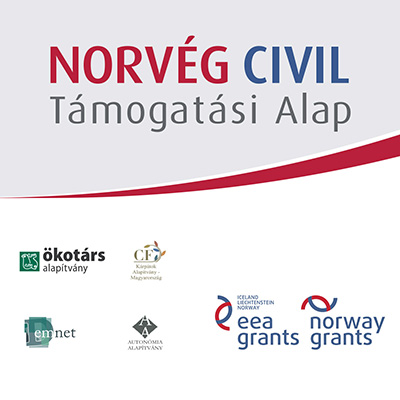The CLXXV Act of 2011 on the right of association, public benefit status and the operation and support of NGOs entered into force on the 1st of January, 2012. This regulation brings important changes into the everyday life of NGOs, especially affecting the conditions of acquiring public benefit status, the precess of registering of organizations, the rules and procedures of reporting and financial management and the termination of organizations.
In order to help the adaptation to and the implementation of the new regulations we developed a practical manual for NGOs and specialists working with them. The manual was at first published online, in a searchable form on the civiljogok.hu webpage.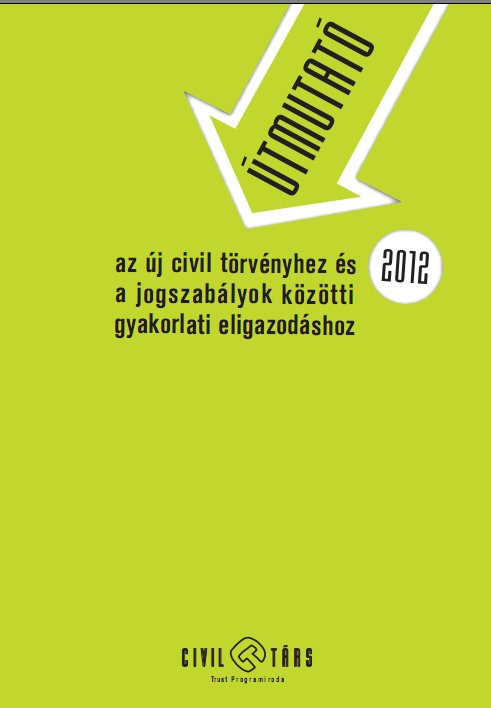
We celebrated the 20th anniversary of our foundation an unusual way: we published „The 35 colors of green”, an interview book that could be a starting point of the yet unwritten history of the Hungarian green movement.
In the book, 35 figures of the green movement talk about their own lifes and the organisations’ they represent. Through these stories we can have a deep insight into the colorful yet coherent history of the movement. The book gives a snapshot, a cross-section of the Hungarian greens, and we can also read about the way these organisations moved through during the last 20-30 years. Beyond the history, these life stories tell us about the hardships and struggles and also the motivations and drives that makes these activists still act after such a long time.
„Outsiders know nothing about the life of „civils” that is free and happy in spite of all hardness, struggle and poverty. Also they don’t know what it is like to be independent and committed at the same time, to live along principles and watch the world through green glasses.”
(Excerpt from the intro by the writer, Csilla Mihalicz.)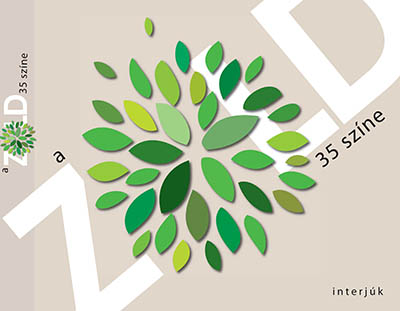
The book is intended to be a resource not only for those who are active in the green movement but also for anyone researching the topic or interested in the history of the recent decades in any way. The volume might be attractive for anyone reading in the problems of environment and sustainable development, therefore it is complemented with a wide glossary helping the reader orient in the jungle of names, organizations and terms.
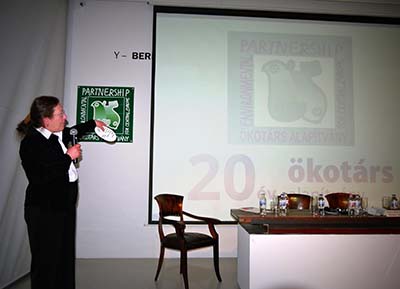
We continued long-standing cooperation with MOL in the framework of the Green Belt program, which has provided help to grass root initiatives for 6 years to create greener and nicer environments with the help of the local citizens through community actions. So far the call attracted mostly rural small communities to submit applications, but this year the call opened up to condos from capital, too. An extra category was announced to help them create and improve green space in the inner yards of these houses. These unused beton surfaces could be easily turned into an oasis to serve the leisure and refreshement of the residents, if they join forces for the cause. We have supported the applicants of the program not with money only, but with a manual of useful tips and tricks of yard greenering.
Until the deadline of the 9th of June altogether 129 applications were submitted, of which 82 were selected for the second phase to be developed into a detailed project through a planning process involving the affected community.
Applications to the funds could be submitted on-line until midnight on the 12th of November 2012. The opportunity reaised great interest: until the deadline 368 valid applications were submitted, distributed among the thematic areas as follows:
NGO Block grant:
After the pre-screening process, applications were evaluated in each priority by 2 independent experts along the criteria published in the call for proposals. The final decision is expected to be made in the beginning of 2013.
The Tree of the Year contest raised great interest in 2012 too: 60 trees were nominated in the competition from which the jury selected 13 for the shortlist. The plane tree from Eger won the contest with 7115 votes, second was the “six-oak” from Kajárpéc with 5973 votes. A pedunculate oak from Szentes had the third place, while the “Acorn Tree” (another oak), nominated in the contest for the third time got the “Hero Tree” award.
We held an unusual award ceremony outdoors in the center of Budapest, where not only the winner trees but a local tree in the park received symbolic present, too: guerilla knitters made a colorful dress for it as a protection for winter.
From 2012, anyone can easily support the contest and the winners with a phonecall. With each call to 13600/53 you donate 250 HUF for Ökotárs and the Tree of the Year contest!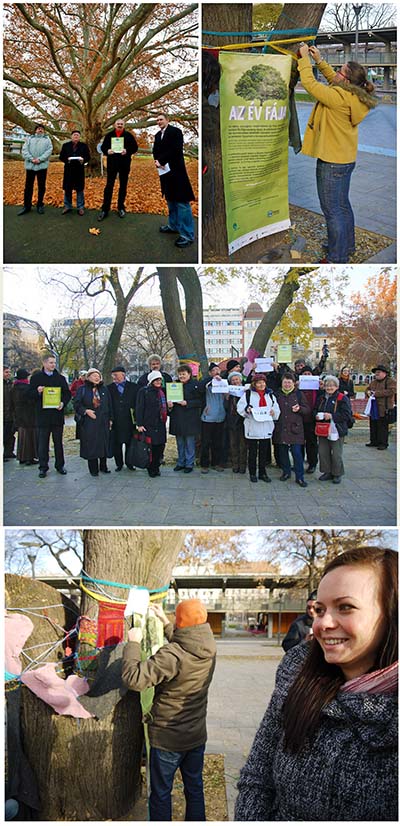
 In the second phase of the Green Belt program 2011/12 the final project plans based on the community planning process could be submitted by the applicants until the 9th of January 2012. Of the 46 organizations whose project concepts were selected in the first phase, finally 28 submitted a detailed plan. The Grant Committee decided on the 14th of February to support 26 of them (from 16 counties) with a total amount of 11,709,130 HUF (app. 41,100 €).
In the second phase of the Green Belt program 2011/12 the final project plans based on the community planning process could be submitted by the applicants until the 9th of January 2012. Of the 46 organizations whose project concepts were selected in the first phase, finally 28 submitted a detailed plan. The Grant Committee decided on the 14th of February to support 26 of them (from 16 counties) with a total amount of 11,709,130 HUF (app. 41,100 €).
Our director, Veronika Móra prepared this year the Hungarian chapter of the USAID report that has been published annually in the last twenty years. The CSO Sustainability Index examines the state of civil society and its organizations around the world along 7 criteria (legal environment, organizational capacity, financial viability, advocacy, service provision, infrastructure and public image).
CSO Sustainability Index Hungary
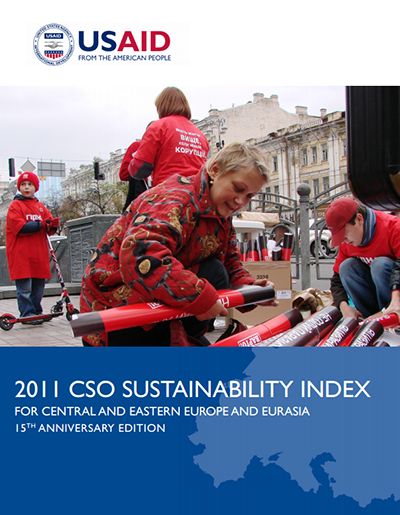
The old lime-tree of Felsőmocsolád won the second European Tree of the Year contest with 11,158 votes. An elm-tree from Köpec, Romania won the second place with 9812 votes and the Bulgarian “wish-tree” became the third with 6071 votes. In one month the seven nominated trees and their stories received 41 thousand votes in all. The nominators of the winner received the award on the occasion of the Green Week in Brussels. The ceremony was hosted by Nadace Partnerstvi (our Czech sister organization) and the IUCN.
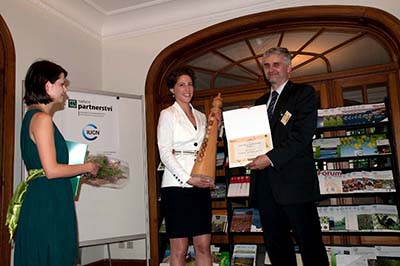
 On the occasion of World Environmental Day and the Teachers’ Day, the 7th of June Zsuzsa Foltányi, the first director of the foundation received the “For our Environment” award from dr. Sándor Fazekas, Minister of Rural Development. Her long-standing work for environment was recognized with the prize. Zsuzsa established the foundation which has prospered and grew under her leadership from an interim program starting in 1991 into a stabil, autonomous organization operating with a seven-eight person crew. During her management the foundation mobilized major foreign sources for the sake of the environment in Hungary and developed a fast, flexible, user-friendly yet transparent grantmaking practice which found many followers since then.
On the occasion of World Environmental Day and the Teachers’ Day, the 7th of June Zsuzsa Foltányi, the first director of the foundation received the “For our Environment” award from dr. Sándor Fazekas, Minister of Rural Development. Her long-standing work for environment was recognized with the prize. Zsuzsa established the foundation which has prospered and grew under her leadership from an interim program starting in 1991 into a stabil, autonomous organization operating with a seven-eight person crew. During her management the foundation mobilized major foreign sources for the sake of the environment in Hungary and developed a fast, flexible, user-friendly yet transparent grantmaking practice which found many followers since then.
 In June we hired a new colleague, Roland Kelemen-Varga who joined us to manage the grants under the “responsed to environmental concerns” thematic area of the Swiss-Hungarian NGO Block Grant and Scholarship Fund. Earlier working for the Carpathian Foundation-Hungary he has experience from the first EEA/Norwegian NGO Fund where he was resposible for the cultural heritage thematic area.
In June we hired a new colleague, Roland Kelemen-Varga who joined us to manage the grants under the “responsed to environmental concerns” thematic area of the Swiss-Hungarian NGO Block Grant and Scholarship Fund. Earlier working for the Carpathian Foundation-Hungary he has experience from the first EEA/Norwegian NGO Fund where he was resposible for the cultural heritage thematic area.
After long period of preparation the Swiss-Hungarian NGO Block Grant and Scholarship Fund was opened with the first call for proposals launched on the 14th of September. This funding mechanism will distribute 5,403,500 CHF (app. 1.3 billion HUF) through open calls between 2012 and 2015 in the following thematic areas:
The Funds are manged by a consortium led by Ökotárs. Members of the consortium are the Autonomia Foundation, Foundation for Development of Democratic Rights (DemNet) and the Carpathian Foundation-Hungary.

Based on the first published on-line version, we issued our handbook supporting the understainding and practical applicationof new NGO regulations in paper,too. You can order the guide, which became very popular among NGOs free of charge from our office (info@okotars.hu, 411-3500).
A new period of the EEA/Norway Funds provided by Norway, Iceland and Lichtenstein was launched in 2013 in Hungary. The goal of the Funds is to reduce economic and social disparities in the European Economic Area as well as to to strengthen bilateral relations between the Donor States and the 15 beneficiary EU countries.
The Operator of the NGO Fund was selected through an open tender organized by the Financial Mechanism Office operating the Funds. We submitted our proposal in the “ usual” consortium with three foundations: Autonomia, DemNet and Carpathian Foundation-Hungary. In the next four years this consortium will be responsible for the managing the NGO Fund with a 12.6 million EUR (more than 3.6 billion HUF) budget.
Aiming to achieve the above mentioned goals an elaborate and complex system of various calls and grants was developed based on our knowledge and experience about the Hungarian NGO sector.
Unlike in the first EEA/Norwegian NGO Fund between 2008-11, it will now be possible to apply for many more topics, but also under more restricted conditions. The calls for proposals will be available in early 2013 at the program website: www.norvegcivilalap.hu, where also the applications can be submitted.